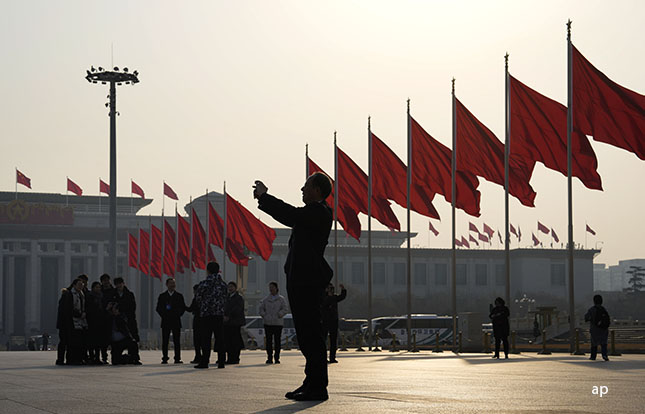
Investors in China may be wondering whether Chinese equities will end the year on a high or will continue to face adversity.
Late September saw China's central bank announce the most dramatic stimulus measures since the pandemic, reducing borrowing costs to boost the ailing property market.
And moves to enhance equity market liquidity lifted domestic stocks, with China's CSI 300 index and Hong Kong’s Hang Seng experienceing a blistering rally. This also spread to China-exposed stocks like European luxury names.
But the exuberance did not last as questions grew about what the Beijing government plans to do next. Chinese equities suffered huge losses on Oct. 9 with the CSI 300 index declining 7.1%, its biggest one-day fall since 2020.
All eyes are now fixed on Saturday when the finance ministry will give a press conference to disclose details on what additional support is in store to boost consumer and business confidence.
Expect More China Equity Volatility
Nicolò Bragazza, associate portfolio manager at Morningstar Investment Management, says that a pullback after such strong market performance is to be expected.
"The rally was driven by a significant change in market sentiment - which was at very depressed levels - following the announcements of new supportive measures," he says.
"One example of how depressed the sentiment was around China is the performance of Chinese equities during the equity sell-off at the beginning of August: Chinese equities barely moved, and the reason was the already very depressed level of valuations."
As the market awaits more clarity around the impact of future policies, Bragazza does not rule out that significant volatility will again drive sharp fluctuations in sentiment.
"The role of fiscal policy is particularly important not only because investors pay a lot of attention to it, but also because balance sheet recessions need this kind of support as monetary policy may prove less effective without coordination with fiscal policy."
"If the government disappoints, we may see some further pullback in Chinese equities, but we believe that the long term rationale for such positions remains intact as it's mainly driven by the sharp disconnection, we see between company fundamentals and their valuations," he says.
What Drove The Initial Stock Rally?
The bull run that led the Chinese equity market to soar after years of stagnation was driven by the Chinese authorities announcing several policies including a mortgage rate cut for existing homeowners and extra liquidity for stock purchases to securities firms and asset managers
"What has developed in the last sort of two to three weeks is a change in the narrative. It's more a sentiment shift rally because policy makers finally capitulated and changed the policy narrative to become a lot more pro-growth and stimulus driven," says Jerry Wu, manager of Polar Capital China Stars Fund, which has a Morningstar Medalist Rating of Silver.
"But a lot of that narrative shift has started to be digested. A lot of that rerating has happened very quickly in a short period of time. Now we are at the juncture where policy needs to deliver," he adds. Wu feels that Chinese authorities still need to provide tangible fiscal stimulus to deal with the country's plight of deflation and fragile consumer sentiment.
"We have reasonable confidence that the sort of narrative pivot of a few weeks ago means they are pretty much committed to getting out of this downward and deflationary spiral."
In this policy-driven market, Wu is hopeful that Saturday's announcement will lead to another rebound for Chinese companies. However, he places significant importance on China's policy towards consumers and property owners to guarantee a sustainable economic and stock market boost.
"The reason why consumer confidence is very low is because their balance sheets are going down. 60% of China's population has assets in housing. But over the last 2 to 3 years, China's property prices have gone down anywhere between 30% to 40% across the board."
"So, when you have 60% of your balance sheet going down and you are not seeing the end of the pricing downward revision, you are not going to spend even if you have quite a lot of savings in your bank account," Wu says.
What Do China Investors Want To See?
Sharukh Malik, portfolio manager of the Bronze-Rated Guinness China A Share Fund, welcomes monetary policy initiatives by the Chinese state, but feels that consumer support should be prioritized as it has been neglected in the past.
"When the government's tried to help the economy, they have tried to help business first rather than the consumer directly. There was a trade program which was announced a few months ago, that's about $21 billion dollars. So if you have got an old washing machine or TV you can trade that in and get a subsidy to buy a new one," he says.
Despite backing the trade-in program, when compared to retail sales last year, this sum of support is worth only 0.3%. Malik feels this package needs to be significantly expanded.
"There are other ways they are trying to support consumers, so consumption vouchers are fairly new. The government gives cash handouts and you can spend them on restaurants, hotels, cinemas. We saw in the past few weeks Shangai giving out $71 million to their residents. It sounds like a big number, but when compared to retail sales its actually tiny."
Malik believes the government will expand support by issuing sovereign bonds which will allow them to raise capital for a larger trading program and "cash clunker schemes" which could even allow the public to trade in used cars for a lump sum to encourage the purchase of electric vehicles.
"What they have done so far makes sense, but it needs to be scaled up. And of course, no one really knows [what they will do]. Is it going to be announced tomorrow or next week? But I can see the path to growth because the government is making it clear in their statements," Malik adds.
Is China The Next Japan?
For Sandy Pei, portfolio manager on the Bronze-Rated Federated Hermes China Equity Fund, believes that any fiscal stimulus decisions must address Chinese deflation to prevent the country from following in Japan's footsteps.
"Why are people still not buying? Because people have no confidence. If you get confidence back, the economy can work on its own," Pei says.
Pei points to the Japanese property market, where yields of 20% are still not encouraging new buyers, who are worried about price weakness in the housing market.
"In Japan because they have seen that for so long, they do not believe property prices can ever go up. And that is very dangerous."
In Pei's view the Chinese authorities must act as soon as possible to ensure that consumption is a bigger driver of the country's economic growth.
What Are The Chinese Stocks To Watch?
"So far, the two-week rally has been driven by retail investors and passive buying," Pei says.
One stock that boosted Pei's portfolio during the rally was Chinese digital broker and wealth management firm Futu Holdings. YTD, the stock's share price has jumped 114% to $110.
"Their business by nature is leveraged and so their earnings will accelerate exponentially because trading volumes have jumped so much. You have seen so many new accounts opening, its crazy. Basically, what did badly before did well- plus brokers, because their business naturally benefits from market turnovers."
Pei also saw her investments in beer and dairy companies boosted during the rally as the market priced in a possible consumer recovery.
Sharukh Malik also saw many of the more obscure names in his portfolio lifted in the rally.
Manufacturer JingSheng Mechanical, consumer chip company Sino Wealth and industrial automation equipment manufacturer Shenzhen Innovision Technology jumped during the China bull run.
"JingSheng has been one of the weaker performers in the last twelve months, although it has rallied sharply in this risk-on environment, even though this sort of stock does not give the most exposure to the rebound," he says.
"Sino Wealth makes basic chips for consumer electronics and battery charging applications. If the consumer is getting cash handouts, they are going to be buying more consumer electronics."
"Shenzhen Innovision Technology is an interesting company, and that stock has done 35% in the past five trading days. The idea is their downstream consumers will get the subsidy from the government to upgrade their equipment."
The top 10 holdings in the Morningstar China Index also saw a boost in their total return rates with JD.com (JD), PDD Holdings (PDD) and Meituan (03690), leading the charge with a total return over the last month of 56.58%, 55.26%, and 51.56% respectively.
A previous iteration of this article incorrectly spelled the companies JingSheng, Sino Wealth and PDD Holdings. The article has now been updated with the correct spellings. We apologise for this error.































